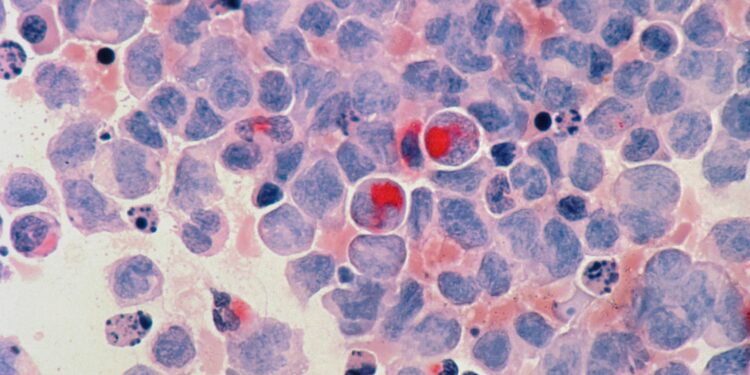Credit: Unsplash/CC0 Public domain
New research from the Sylvester Comprehensive Cancer Center at the University of Miami Miller School of Medicine and collaborating organizations has identified a next-generation BTK degrader that could help overcome treatment resistance in chronic lymphocytic leukemia (CLL). and associated blood cancers.
Their conclusions, published on February 2 in the journal Sciencecould provide a therapeutic option for CLL patients whose tumors become drug resistant or do not respond to first-line therapy.
“This new compound not only inhibits the cellular BTK molecule, but goes further by targeting the target and destroying it,” explained Justin Taylor, MD, a research hematologist at Sylvester and lead author of the study. “This is an exciting new class of drugs called BTK degraders.”
CLL is an incurable cancer of the blood and bone marrow that affects about 20,000 people each year in the United States and accounts for about a quarter of new leukemia cases, according to the American Cancer Society. It mainly affects older people, with the average age at diagnosis being 70 years.
Patients diagnosed with CLL are often prescribed targeted medications called BTK inhibitors that can shrink tumors, ease symptoms and extend lifespan. But some patients develop resistance to the drugs, limiting their treatment options.
Currently approved drugs like ibrutinib work by inactivating the cellular molecule called BTK (Bruton’s tyrosine kinase). Ibrutinib and other approved inhibitors do not destroy their targets. Instead, they bind to it and modulate activity.
For example, ibrutinib and other inhibitors bind to the BTK enzyme that keeps B cells alive in leukemia. The drugs suppress BTK activity, leading to death of B cells in CLL and other blood malignancies.
For this study, Taylor and colleagues, including first author Skye Montoya, a graduate student in his research lab, Omar Abdel-Wahab, MD, of Memorial Sloan Kettering Cancer Center, and other collaborators evaluated the new compound in the framework of laboratory studies and a phase I study. clinical trial involving patients with tumors that have become resistant to drugs or do not respond to treatment.
Developed by Nurix Therapeutics, the compound, called NX-2127, is built with two modules: one that binds to BTK and another that degrades and eliminates it. Thus, the term BTK degrader.
The researchers reported that NX-2127 effectively destroyed its cellular targets in petri dishes and in patient cells. “Specifically, this compound destroyed BTK cells in tumors resistant to currently used BTK inhibitors, while shrinking tumors in 11 of 14 CLL patients participating in our study,” said Abdel-Wahab, co-author. corresponding with Taylor.
One patient, in particular, had an impressive response to this BTK degrader, Taylor and Abdel-Wahab noted. The elderly man had been taking pirtobrutinib for two years, but he became resistant to it and other therapies, leaving him with no other conventional options.
However, while he took NX-2127 during the trial, his symptoms and quality of life improved to the point where he no longer needed transfusions for the anemia, they said.
Analysis of a more in-depth study
Although this study had a data cutoff date of September 2022 for the Science publication, the researchers provided an update last December at the American Society of Hematology meeting. Overall, 41% of CLL patients responded to NX-2127 and the elderly man still responded favorably to the drug.
Additionally, research has shown that drug resistance can arise when BTK acquires mutations that give it an entirely new function. These mutations cause BTK to function as a “scaffold” that recruits other cellular molecules to keep B cells alive.
Most importantly, NX-2127 appears to overcome resistance caused by virtually all BTK mutations identified as causing resistance to available BTK inhibitors.
Taylor believes BTK degraders have the potential to treat other B-cell malignancies or even autoimmune diseases such as multiple sclerosis. He and his colleagues, including Alvaro Alencar, MD, a Sylvester research hematologist and contributing author of the study, are currently recruiting patients in another study testing a more potent and selective BTK degrader, NX-5948, also from Nurix.
“CLL is an incurable disease, but with treatments like BTK inhibitors and these promising new BTK degraders, we have more ways to relieve symptoms and get patients back to their normal daily routines,” he said. Montoya said. “The future looks better for them.”
More information:
Skye Montoya et al, Kinase-impaired BTK mutations are sensitive to BTK clinical stage and IKZF1/3 degrader NX-2127, Science (2024). DOI: 10.1126/science.adi5798. www.science.org/doi/10.1126/science.adi5798
Provided by University of Miami Leonard M. Miller School of Medicine
Quote: Targeting treatment resistance in chronic lymphocytic leukemia with a compound that goes beyond current BTK inhibitors (February 1, 2024) retrieved February 1, 2024 from
This document is subject to copyright. Except for fair use for private study or research purposes, no part may be reproduced without written permission. The content is provided for information only.



